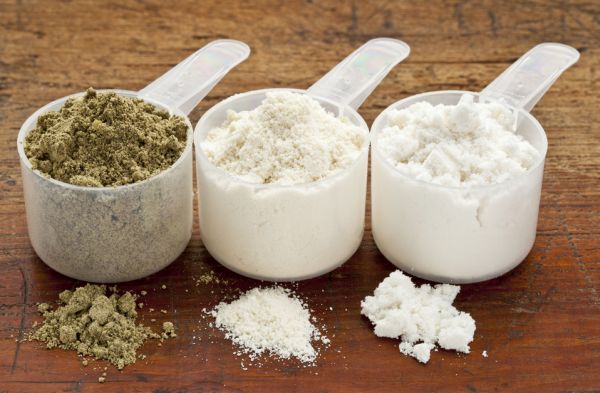When it comes to getting fit, or getting good at anything, really, there are two distinct phases:
- Learning and applying the fundamentals.
- Learning and applying ways to optimize your results.
And if you want to build muscle and strength faster, eating protein before bed can help…
…but it’s not nearly as important as some people would have you believe.
You see, eating protein before bed falls squarely in bucket #2 above. If you don’t have the fundamentals in place, such as…
- properly calculating and counting your calories and macros…
- emphasizing heavy, compound weightlifting in your training…
- following a sensibly designed workout program…
…when you eat protein simply won’t matter.
And nor will many other things, like what types of supplements you take, how many carbs you eat, how “clean” your diet is, how often you change up your workouts, and much more.
Once you have #1 squarely in place (fundamentals), though, and you’re looking for ways to get more out of your training, then it makes sense to start dipping into #2 (optimization).
And this article will help.
Want to listen to more stuff like this? Check out my podcast!
Does Protein Before Bed Prevent Muscle Loss?
I used to think the reason for eating protein before bed was preventing muscle loss.
If you eat your last meal at, let’s say, 6 PM, your body will have finished processing it by midnight (if not earlier), which leaves it without nutrients for many hours.
That sounds like bad news.
Once your body runs out of amino acids to “feed” the muscles, it starts to break muscle tissue down, right?
Well, the simple answer is no. That’s not how it works at all, actually.
Your body doesn’t cannibalize muscle so easily and you don’t have to eat protein before bed to preserve it.
That said, I do recommend you eat protein before bed. Just for a different reason.
Is Eating Protein Before Bed Good for Building Muscle?

Yes. And this is why I recommend it.
Let’s go back to the 6 PM dinner example given earlier. Your body has finished processing your meal by midnight and doesn’t get another infusion of nutrients for another eight hours.
Well, muscle growth requires two things: a stimulus and the raw materials.
Training your muscles is a stimulus, of course, but so is eating protein. Both of these things tell your body to build and repair muscle, and you need both to increase your total lean mass over time.
Amino acids, which are obtained through eating protein, are the raw materials that muscle tissue is built from.
If no amino acids are available for use, your body can’t build any muscle. This is why research has shown that, if protein isn’t eaten before bed, protein synthesis rates are quite low when we sleep.
This, then, leads us to how eating protein before bed helps you build muscle and strength faster:
It gives your body amino acids to use for repair while you sleep.
This means that instead of having to put protein synthesis “on hold” while you sleep, your body can continue building and repairing muscle tissue.
And as most people spend about 1/3 of their day sleeping, you can see why this adds up over time.
Is Eating Protein Before Bed Good for Weight Loss?

It’s often claimed that protein before bed will “boost your metabolism” and help you lose fat faster.
There’s even research that is often cited to “prove” this:
One study found that eating 30 grams of whey or casein protein 30 minutes before sleep increased subjects’ resting energy expenditure the next morning compared to those that ate nothing or carbohydrates alone.
That makes for a good sound bite but it’s not proof that protein before bed is going to help you lose weight.
It’s just proof that protein costs more energy to digest and process than carbs, which cost more energy than dietary fat.
What will help you lose fat faster, though, is a high-protein diet, and one of the reasons relates to this “energy cost” of food.
The energy required to metabolize food is known as the thermic effect, which is also the metabolic “boost” that comes with eating.
The magnitude and duration of the boost depends on how much you eat. A small meal causes a small, temporary metabolic spike that and a large meal produces a larger spike that lasts longer.
Now, when you look at the bigger picture of weight loss–burning more energy than you consume–the total energy burned every day from the thermic effect of food matters.
The higher the combined thermic effect of all the meals you eat every day, the more your diet will help you lose weight.
(You can erase the advantage completely by eating too many calories, of course, but you get the idea.)
Now, when you allot a large percentage of your daily calories to protein, you burn more of those calories while at rest. And this is one of the reasons why a high-protein diet is great for losing weight.
That said, one individual high-protein meal–like one before bed–isn’t better or different than another, and certainly isn’t going to make a difference in the absence of a high-protein diet.
If someone is eating a low-protein diet, a serving of protein before bed isn’t going to help them lose weight faster.
And if they’re eating a high-protein diet, their last bit of protein for the day could come at dinner or before bed and the thermic effect is the same.
This is why it’s misleading to say that protein before bed helps you lose weight faster.
A more accurate statement would be that protein before bed can help you follow a high-protein diet, which can help you lose weight faster.
How Much Protein Should You Eat Before Bed?

To answer this question, let’s define our goal with eating protein before bed. It’s twofold:
- Maximally stimulate protein synthesis.
- Keep amino acids in our blood for as much of the sleep period as possible.
Let’s look at these points separately.
How Much Protein For Maximal Protein Synthesis?
The thing that determines protein’s potency in stimulating protein synthesis is the amount of leucine it contains.
This is because leucine is the amino acid in protein that is most responsible for initiating protein synthesis.
And this is why research shows that high-protein meals higher in leucine stimulate more protein synthesis than high-protein meals lower in it.
Now, there’s obviously a ceiling to this effect. Unfortunately, eating 150 grams of protein in one sitting isn’t ten times more anabolic than 15 grams.
The question, then, is how much protein (and leucine) maximally stimulates protein synthesis rates?
Well, a study conducted by researchers at McMaster University had six young, healthy men resistance train their legs and then eat 0, 5, 10, 20, or 40 grams of egg protein.
What the scientists found is that 40 grams (containing about 3.5 grams of leucine) resulted in the most protein synthesis. It was only slightly higher than 20 grams, however, which was significantly higher than 10 grams.
Another interesting study on the matter found that tripling the post-workout dose of leucine from 5 to 15 grams increased protein synthesis rates by only 13%, which is relatively low given the large increase in leucine.
Yet another study found only slight differences in protein synthesis rates between post-workout protein doses containing 1.8 and 3.5 grams of leucine respectively.
The key takeaway here is once you get over 2 grams of leucine, or about 20 grams of a high-quality protein like whey or egg, the benefits to protein synthesis rates greatly diminish.
Personally, when I eat protein, I eat at least 30 to 40 grams.
So now that we’ve found out how much protein you need to maximally stimulate protein synthesis, let’s look at the next point:
How to keep amino acids in our blood for as much of the sleep period as possible.
Fortunately, this one is pretty straightforward.
What Kind of Protein Should You Eat Before Bed?

Many people have whey protein before bed. This is better than nothing but it’s not quite ideal because whey is digested and abosrbed fairly rapidly.
Specifically, research shows that the human body can absorb 8 to 10 grams of whey protein per hour. This means a large amount would be required before bed to keep plasma amino acid levels high throughout the night.
Better choices are (cooked) egg protein or casein protein, which are absorbed at 3 and 6.1 grams per hour respectively.
As you can see, 30 to 40 grams of either egg or casein protein before bed is accomplishes both of our goals: it maximally stimulates protein synthesis rates and keeps amino acids in our blood for the entire night.
For egg protein, you can eat eggs or egg whites or use a powder, and for casein, you can eat a casein-rich food like cottage cheese or Greek yogurt, or use a powder.
What About Carbs Before Bed?

Since we’re on the subject of eating before bed, let’s take a quick detour and talk about another much-misunderstood aspect of pre-sleep nutrition: carbs.
I used to think that a large insulin spike before bed may (to some degree) impair weight loss by suppressing growth hormone production, much of which occurs during sleep, but my fears were unfounded.
The long story short is the body works around it and, in the end, weight loss isn’t affected whatsoever by eating carbs late at night. And there’s clinical evidence of this.
- This study found that calorie intake in the morning or evening didn’t affect weight loss or body composition parameters.
- This study demonstrated interesting results: subjects that normally ate breakfast lost more weight skipping it and eating the majority of calories at dinner, whereas subjects that normally skipped breakfast lost more weight eating breakfast every day. Researchers chalked this up to greater levels of satiety and thus better dietary compliance.
- This study showed that splitting up calories into 5 equal meals per day eaten between 9 AM and 8 PM, eating all calories in the morning, or all in the evening, didn’t affect weight loss parameters or body composition.
The point here is so long as your calorie intake and macronutrient balance are right, when you eat your food doesn’t matter. Do what you like best.
Personally I eat about 250 grams of carbs at 9 or 10 PM every day because I enjoy it. And here’s the look I maintain year round:
The Bottom Line on Protein Before Bed
You don’t have to eat protein before bed to make good progress in building muscle and strength, but research clearly shows that it helps. And when you’re a natural weightlifter, you want to take every little boost you can get.
So, take advantage of what you now know and plan 30 to 40 grams of a slow-burning protein like egg or casein into your daily meal plans.
What’s your take on protein before bed? Have anything else to share? Let me know in the comments below!
Scientific References +
- Nonino-Borges CB, Martins Borges R, Bavaresco M, Suen VMM, Moreira AC, Marchini JS. Influence of meal time on salivary circadian cortisol rhythms and weight loss in obese women. Nutrition. 2007;23(5):385-391. doi:10.1016/j.nut.2007.02.007
- Schlundt DG, Hill JO, Sbrocco T, Pope-Cordle J, Sharp T. The role of breakfast in the treatment of obesity: A randomized clinical trial. Am J Clin Nutr. 1992;55(3):645-651. doi:10.1093/ajcn/55.3.645
- Sensi S, Capani F. Chronobiological aspects of weight loss in obesity: effects of different meal timing regimens. Chronobiology International, 4(2), 251–61. Retrieved from http://www.ncbi.nlm.nih.gov/pubmed/3508745f. Chronobiol Int. 1987;4(2):251-261. http://www.ncbi.nlm.nih.gov/pubmed/3508745. Accessed October 3, 2019.
- Ji S, Guan R, Frank SJ, Messina JL. Insulin inhibits growth hormone signaling via the growth hormone receptor/JAK2/STAT5B pathway. J Biol Chem. 1999;274(19):13434-13442. doi:10.1074/jbc.274.19.13434
- Bilsborough S, Mann N. A review of issues of dietary protein intake in humans. Int J Sport Nutr Exerc Metab. 2006;16(2):129-152. http://www.ncbi.nlm.nih.gov/pubmed/16779921. Accessed October 3, 2019.
- Boirie Y, Dangin M, Gachon P, Vasson MP, Maubois JL, Beaufrère B. Slow and fast dietary proteins differently modulate postprandial protein accretion. Proc Natl Acad Sci U S A. 1997;94(26):14930-14935. doi:10.1073/pnas.94.26.14930
- Glynn EL, Fry CS, Drummond MJ, et al. Excess Leucine Intake Enhances Muscle Anabolic Signaling but Not Net Protein Anabolism in Young Men and Women. J Nutr. 2010;140(11):1970-1976. doi:10.3945/jn.110.127647
- Rowlands DS, Nelson AR, Phillips SM, et al. Protein-leucine fed dose effects on muscle protein synthesis after endurance exercise. Med Sci Sports Exerc. 2015;47(3):547-555. doi:10.1249/MSS.0000000000000447
- Moore DR, Robinson MJ, Fry JL, et al. Ingested protein dose response of muscle and albumin protein synthesis after resistance exercise in young men. Am J Clin Nutr. 2009;89(1):161-168. doi:10.3945/ajcn.2008.26401
- Luiking YC, Deutz NEP, Memelink RG, Verlaan S, Wolfe RR. Postprandial muscle protein synthesis is higher after a high whey protein, leucine-enriched supplement than after a dairy-like product in healthy older people: a randomized controlled trial. Nutr J. 2014;13:9. doi:10.1186/1475-2891-13-9
- Kimball SR, Jefferson LS. Regulation of protein synthesis by branched-chain amino acids. Curr Opin Clin Nutr Metab Care. 2001;4(1):39-43. http://www.ncbi.nlm.nih.gov/pubmed/11122558. Accessed October 3, 2019.
- Norton LE, Layman DK. Leucine Regulates Translation Initiation of Protein Synthesis in Skeletal Muscle after Exercise. J Nutr. 2006;136(2):533S-537S. doi:10.1093/jn/136.2.533s
- Paddon-Jones D, Westman E, Mattes RD, Wolfe RR, Astrup A, Westerterp-Plantenga M. Protein, weight management, and satiety. Am J Clin Nutr. 2008;87(5):1558S-1561S. doi:10.1093/ajcn/87.5.1558S
- Buchholz AC, Schoeller DA. Is a calorie a calorie? 1-4 Andrea C Buchholz and Dale A Schoeller. 2004;79:899-906. doi:10.1093/ajcn/79.5.899S
- Bellisle F, McDevitt R, Prentice AM. Meal frequency and energy balance. [Review] [48 refs]. Br J Nutr. http://ovidsp.ovid.com/ovidweb.cgi?T=JS&CSC=Y&NEWS=N&PAGE=fulltext&D=med4&AN=9155494. Accessed October 3, 2019.
- Horton TJ, Drougas H, Brachey A, Reed GW, Peters JC, Hill JO. Fat and carbohydrate overfeeding in humans: different effects on energy storage. Am J Clin Nutr. 1995;62(1):19-29. doi:10.1093/ajcn/62.1.19
- Swaminathan R, King RFGJ, Holmfield J, Siwek RA, Baker M, Wales JK. Thermic effect of feeding carbohydrate, fat, protein and mixed meal in lean and obese subjects. Am J Clin Nutr. 1985;42(2):177-181. doi:10.1093/ajcn/42.2.177
- Madzima TA, Panton LB, Fretti SK, Kinsey AW, Ormsbee MJ. Night-time consumption of protein or carbohydrate results in increased morning resting energy expenditure in active college-aged men. Br J Nutr. 2014;111(1):71-77. doi:10.1017/S000711451300192X
- Snijders T, Res PT, Smeets JSJ, et al. Protein Ingestion before Sleep Increases Muscle Mass and Strength Gains during Prolonged Resistance-Type Exercise Training in Healthy Young Men. J Nutr. 2015;145(6):1178-1184. doi:10.3945/jn.114.208371
- Res PT, Groen B, Pennings B, et al. Protein ingestion prior to sleep improves post-exercise overnight recovery. Med Sci Sport Exerc. 44(8):1560-1569. https://www.ncbi.nlm.nih.gov/pubmed/22330017. Accessed October 3, 2019.
- Groen BBL, Res PT, Pennings B, et al. Intragastric protein administration stimulates overnight muscle protein synthesis in elderly men. Am J Physiol - Endocrinol Metab. 2012;302(1). doi:10.1152/ajpendo.00321.2011
- Beelen M, Tieland M, Gijsen AP, et al. Coingestion of Carbohydrate and Protein Hydrolysate Stimulates Muscle Protein Synthesis during Exercise in Young Men, with No Further Increase during Subsequent Overnight Recovery. J Nutr. 2008;138(11):2198-2204. doi:10.3945/jn.108.092924
- Muckelbauer R, Sarganas G, Grüneis A, Müller-Nordhorn J. Association between water consumption and body weight outcomes: a systematic review. Am J Clin Nutr. 2013;98(2):282-299. doi:10.3945/ajcn.112.055061
- Soeters MR, Lammers NM, Dubbelhuis PF, et al. Intermittent fasting does not affect whole-body glucose, lipid, or protein metabolism. Am J Clin Nutr. 2009;90(5):1244-1251. doi:10.3945/ajcn.2008.27327










